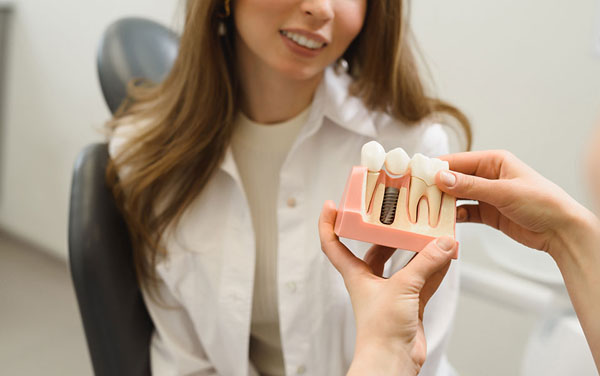Dental Implant Restorations in Studio City & Los Angeles, CA
Fix Your Smile and Replace Missing Teeth
Dental implants are a tooth replacement option that involves the surgical placement of small metal posts into the jawbone to support a natural-looking prosthetic. Their design mimics the look and function of natural teeth, providing individuals with a fully restored beautiful smile. Our dentist in Los Angeles & Studio City can use them to restore one or several missing teeth.
At Dr. Sam A. Lavi, our Los Angeles & Studio City dentist offers dental implant surgery and treatment options. We’re here to help you meet your oral health goals and restore the function and beauty of your smile. Contact our dental office today by calling (213) 623-2212 to schedule an appointment.
What Are Dental Implants?
 Dental implants are a revolutionary tooth replacement solution designed to look, feel, and function like natural teeth. They’re small, biocompatible titanium posts surgically placed into your jawbone to act as artificial tooth roots. These implants fuse with the jawbone through a natural process called osseointegration, creating a strong foundation for a permanent replacement tooth.
Dental implants are a revolutionary tooth replacement solution designed to look, feel, and function like natural teeth. They’re small, biocompatible titanium posts surgically placed into your jawbone to act as artificial tooth roots. These implants fuse with the jawbone through a natural process called osseointegration, creating a strong foundation for a permanent replacement tooth.
Types of Dental Implants
Endosteal Dental Implants
The most common type of dental implant is endosteal. With endosteal dental implants, the post is inserted directly into the bone and is used for those with enough bone structure to support it.
Single-Tooth Dental Implants
Single-tooth dental implants completely replace one lost tooth from root to crown. It involves placing a titanium implant into the jawbone that serves as the foundation for a custom-made prosthetic single-tooth replacement. Most patients receive a dental crown as the visible portion of their dental implant treatment. Single-tooth replacement with a dental implant provides patients with a permanent solution for missing or damaged teeth.
All-On-Four
All-on-four dental implants are full-arch replacement options. It involves placing four dental implants in the upper or lower jawbone and securing a full arch of prosthetic replacement teeth to them. The All-on-four technique is less invasive and can be completed in one day. All-on-four implants are a good option for those with lower bone density, as they restore a full arch of prosthetic teeth while using fewer implant posts.
Implant-Supported Bridges
Implant-supported bridges are excellent options for replacing multiple teeth. A traditional dental bridge or artificial tooth root is anchored to the jaw using dental implants. The bridge is typically made of two or more artificial teeth attached to the implant abutments. The number of posts needed will vary depending on the size of the bridge.
Implant-Supported Dentures
Implant-supported dentures are removable appliances anchored to the mouth and jaw using dental implants. They provide a more secure fit and eliminate messy adhesives that removable dentures typically need. Implant-supported dentures are also a more stable option than traditional dentures and can improve oral health by providing stimulation to the jawbone.
Mini Dental Implants
Mini dental implants are a smaller version of traditional implants. They’re a less invasive implant surgery option typically used to replace a single tooth or stabilize a loose denture. They shorten the healing process and have a lower cost. However, they may not be suitable for patients with less bone density.
Immediate-Load “Same Day” Dental Implants

Zygomatic Dental Implants
Zygomatic dental implants can restore lost teeth for patients who don’t have enough jawbone density to support a traditional endosteal implant. While zygomatic implants are still in use, they’re less common today and aren’t used by our Los Angeles & Studio City dentist.
Subperiosteal Dental Implants
Subperiosteal dental implants sit on the jawbone but under the gum tissue. Subperiosteal implants are rarely used because of modern technological advancements in implant dentistry.
Benefits of Dental Implants
Dental implants offer many benefits that go beyond simply replacing missing teeth. Here are some of the advantages:
- Improved Aesthetics: Implants provide a natural-looking replacement that blends with your existing teeth, restoring your beautiful smile and boosting your confidence.
- Enhanced Speech and Eating: Unlike dentures that can slip or become loose, implants function like natural teeth, allowing you to speak clearly and chew food comfortably.
- Superior Oral Health: Implants prevent jawbone loss and promote better oral health by eliminating the need to grind down healthy teeth for bridges.
- Durability and Longevity: Made from strong titanium, dental implants are highly durable and can last a lifetime with proper care.
- Improved Quality of Life: By restoring your ability to speak, eat, and smile confidently, dental implants can significantly improve your quality of life.
Candidacy for Dental Implants
Dental implants are a versatile solution for many patients with missing teeth, but they aren’t always the right fit for everyone. If you don’t qualify for implants, we offer supplemental procedures to boost candidacy.

- Overall Health: Generally, good overall health is crucial for implant surgery. Patients with uncontrolled chronic conditions like diabetes may require additional evaluation and management before proceeding.
- Jawbone Health: Sufficient jawbone density is essential for successful osseointegration, the fusion process between the implant and jawbone. Patients with significant bone loss may require bone grafting procedures before implant placement.
- Gum Health: Healthy gums are necessary for a successful implant procedure and long-term implant health. Patients with active gum disease will need to undergo treatment beforehand.
- Smoking: Smoking can impede healing and increase the risk of implant failure. Quitting smoking before implant surgery is highly recommended.
The Dental Implant Process
The dental implant process typically involves multiple stages, spread over several months. Here’s a general overview:
- Consultation and Treatment Plan: As discussed earlier, this initial consultation establishes your candidacy and outlines the treatment plan.
- Implant Placement Surgery: During this outpatient surgery, the dentist places the titanium implant post(s) into the jawbone. Local anesthesia ensures patient comfort during the procedure.
- Healing and Osseointegration: Following surgery, a healing period of several months is necessary for the implant to fuse with the jawbone. During this time, you’ll wear temporary restorations or adjustments to existing teeth to maintain functionality.
- Abutment Placement: Once osseointegration is complete, Dr. Lavi attaches a small connector piece called an abutment to the implant, emerging above the gum line.
- Crown Placement: Dr. Lavi then places the custom-made prosthetic crown (or bridge/denture) onto the abutment, creating the visible restoration that completes your new tooth.
Aftercare for Dental Implants

- Bleeding and Swelling: Slight bleeding and swelling are normal after surgery. Apply gentle pressure to the surgical site with gauze pads to control bleeding. Applying cold compresses to the outside of your face can help reduce swelling.
- Pain Management: Your dentist will prescribe medication to manage any discomfort. Take medication as directed and don’t hesitate to contact them if pain persists.
- Diet: Stick to a soft diet for the first few days after surgery. Gradually progress to softer solid foods as healing progresses. Avoid chewing directly on the implant site and hard, crunchy, or sticky foods.
- Oral Hygiene: Maintaining good oral hygiene is essential to prevent infection. Gently brush and floss around the implant site, avoiding direct contact with the surgical site. Use a prescribed antibacterial mouthwash as directed by Dr. Lavi.
- Rest and Avoid Strenuous Activity: Get plenty of rest to promote healing. Avoid strenuous exercise and activities that could pressure the implant site for the first few days.
Frequently Asked Questions
Yes, a missing tooth does need to be replaced as soon as possible. Here’s why:
- Shifting of surrounding teeth: When you have a missing tooth, the surrounding teeth may shift to fill the gap. This can lead to misalignment and bite problems.
- Bone loss: The jawbone needs stimulation from the roots of the teeth to maintain its density. When a tooth is missing, the jawbone may shrink, leading to bone loss.
- Increased risk of periodontal disease: Missing teeth can create space for bacteria to accumulate, increasing your risk of gum disease.
- Difficulty speaking and eating: Missing teeth can make it difficult to speak clearly and chew food properly.
Here are the types of dental professionals qualified to place dental implants:
- Oral and Maxillofacial Surgeon: Has the most extensive training and experience in implant placement.
- Periodontist: Specializes in treating gum disease and placing dental implants.
- Prosthodontist: Specializes in replacing missing teeth and restoring natural teeth.
- General Dentist: May also be qualified depending on their training and experience.
On average, dental implants can last between 20 years and a lifetime. To maximize their lifespan, practice excellent oral hygiene and attend regular dental checkups and cleanings.
Determine the Best Implant Treatment for Your Needs with Dr. Lavi
Ready to find out if dental implants are exactly what your smile needs? For those in Los Angeles & Studio City, contact our implant dentist today at (213) 623-2212 to schedule a consultation and see how we can improve your oral health with a customized treatment plan. We also welcome patients from Sherman Oaks, North Hollywood, Universal City, and Toluca Lake, CA.


